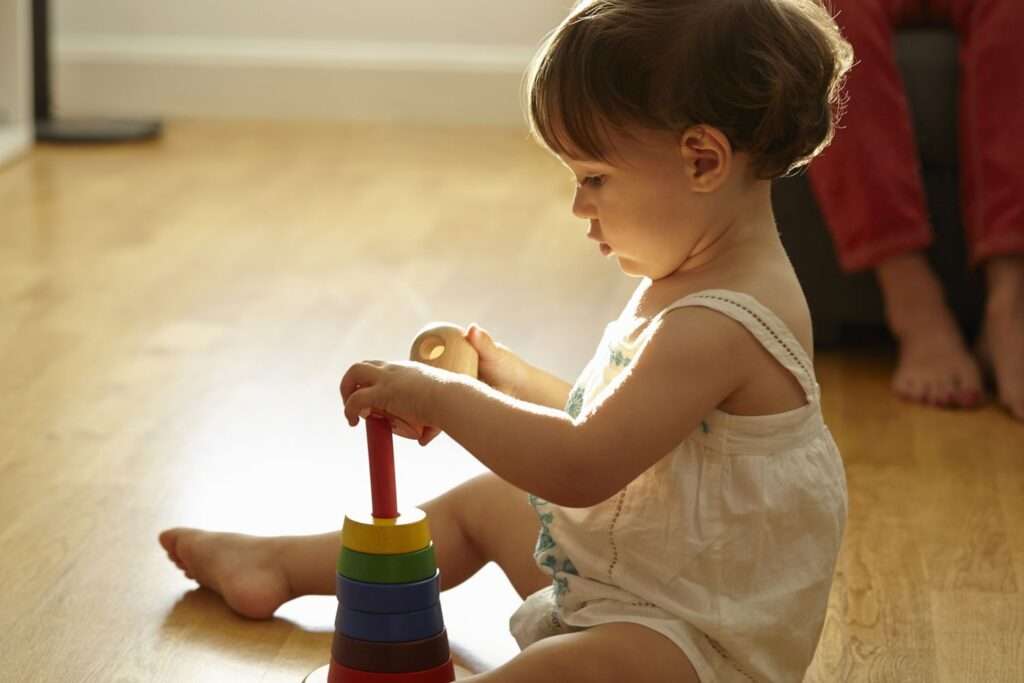Definition and Importance
Cognitive development refers to how a baby learns to think, explore, and figure things out. It is the process of acquiring knowledge and understanding through thought, experience, and the senses. Cognitive development is crucial as it lays the foundation for a child’s future learning abilities, problem-solving skills, and overall intellectual growth.
Overview of Cognitive Development Stages
Cognitive development occurs in stages, each characterized by different abilities and milestones. Understanding these stages helps parents provide the appropriate support and activities to encourage their baby’s growth.
2. Understanding Cognitive Development Milestones
Newborn to 3 Months
During the first three months, babies learn to recognize their parents, follow moving objects with their eyes, and react to loud sounds. This stage is all about sensory experiences and the beginnings of basic motor skills.
4 to 6 Months
Babies start to explore objects with their hands and mouth, recognize familiar faces, and respond to their name. They also begin to understand cause and effect, like shaking a rattle to make noise.
7 to 9 Months
At this stage, babies can sit without support, crawl, and have improved hand-eye coordination. They start to enjoy more complex play, such as stacking blocks and exploring objects’ properties.
10 to 12 Months
By the end of the first year, babies can often stand and walk with assistance, understand simple commands, and demonstrate more intentional play, such as putting objects into containers and then taking them out.

3. Creating a Stimulating Environment
Importance of a Stimulating Environment
A stimulating environment is rich in sensory experiences, offering varied sights, sounds, textures, and activities. This environment is vital for promoting cognitive growth as it encourages exploration and learning.
Safe Spaces for Exploration
Creating safe spaces allows babies to explore freely without the risk of injury. Childproofing areas where babies play ensures they can investigate their surroundings safely, fostering independence and curiosity.
Incorporating Sensory Experiences
Integrating sensory activities, such as playing with different textures, listening to various sounds, and observing bright colors, enhances cognitive development. These activities help babies make sense of the world around them.
4. Interactive Playtime
Types of Play Beneficial for Cognitive Growth
Interactive play is essential for cognitive development. Games like peek-a-boo, pat-a-cake, and simple puzzles help babies understand object permanence, cause and effect, and problem-solving skills.
Age-Appropriate Toys and Activities
Choosing toys and activities suitable for your baby’s age ensures they are both safe and challenging. For example, soft blocks, shape sorters, and musical toys are excellent for cognitive stimulation.
Encouraging Problem-Solving Skills
Problem-solving activities, like puzzles and stacking toys, encourage babies to think critically and develop solutions. These skills are fundamental for later learning and intellectual growth.
5. Promoting Language Development
Talking to Your Baby Regularly
Engaging in frequent conversations with your baby, even before they can respond, helps them learn language patterns and sounds. Describe your actions, name objects, and express your emotions to build their vocabulary.
Reading Aloud and Storytelling
Reading to your baby from an early age fosters language development and a love for books. Choose colorful, simple books and use expressive voices to keep them engaged.
Singing and Nursery Rhymes
Singing songs and nursery rhymes introduces babies to the rhythm and melody of language. Repetition of rhymes helps them recognize words and sounds, enhancing their auditory skills.
6. Encouraging Social Interactions
Benefits of Social Interaction
Social interactions are crucial for cognitive and emotional development. They help babies learn communication skills, empathy, and understanding of social cues.
Playdates and Group Activities
Organizing playdates and group activities exposes babies to different environments and interactions. These experiences teach them to share, take turns, and cooperate with others.
Role of Family in Social Development
Family members play a significant role in a baby’s social development. Regular interaction with parents, siblings, and extended family members provides a secure base for exploring social relationships.
7. Using Everyday Activities for Learning
Turning Daily Routines into Learning Opportunities
Everyday activities, like bathing, dressing, and feeding, can become learning moments. Talk to your baby about what you are doing, name objects, and encourage them to participate.
Educational Benefits of Household Chores
Involving your baby in simple household chores, like sorting laundry or setting the table, teaches them about organization, responsibility, and basic problem-solving.
Grocery Shopping as a Learning Experience
Taking your baby grocery shopping can be educational. Point out different foods, colors, and shapes, and talk about their uses. This activity helps with language development and cognitive recognition.
8. Supporting Motor Skills Development
Importance of Fine and Gross Motor Skills
Motor skills are essential for overall development. Fine motor skills involve small movements, like grasping objects, while gross motor skills include larger movements, like crawling and walking.
Activities to Enhance Motor Skills
Activities like tummy time, crawling, and using utensils improve motor skills. Providing toys that require manipulation, such as stacking rings, can also enhance fine motor abilities.
Monitoring Developmental Progress
Regularly monitoring your baby’s motor skill development ensures they are on track. Consult with a pediatrician if you notice significant delays to address any potential concerns early.
9. Introducing Problem-Solving Games
Types of Problem-Solving Games for Babies
Games like peek-a-boo, stacking blocks, and simple puzzles introduce babies to problem-solving. These activities require them to think and make decisions, which boosts cognitive development.
Benefits of Early Problem-Solving Skills
Developing problem-solving skills early on lays the groundwork for future learning. It enhances critical thinking, creativity, and the ability to approach challenges with confidence.
DIY Problem-Solving Activities
Creating DIY problem-solving activities, like hiding toys for your baby to find or creating simple obstacle courses, can be fun and educational. These activities encourage exploration and cognitive engagement.
10. Fostering Creativity and Imagination
Role of Creativity in Cognitive Development
Creativity plays a significant role in cognitive growth. It encourages babies to think outside the box, explore new ideas, and develop innovative solutions.
Activities to Encourage Creative Thinking
Activities like drawing, playing with clay, and imaginative play stimulate creativity. Provide materials that allow your baby to express themselves freely and explore their imagination.
Importance of Unstructured Play
Unstructured play is crucial for cognitive development as it allows babies to explore and experiment without specific goals. This type of play fosters independence and creative thinking.
11. Encouraging Curiosity and Exploration
Nurturing a Curious Mind
Encouraging curiosity in your baby promotes cognitive growth. Answer their questions, provide diverse experiences, and allow them to explore their interests.
Safe Exploration Activities
Safe exploration activities, like sensory bins, outdoor play, and water play, provide new experiences and stimulate cognitive development. Ensure these activities are supervised and safe.
Responding to Your Baby’s Curiosity
Respond positively to your baby’s curiosity. Engage with their interests, provide explanations, and encourage them to ask more questions. This interaction fosters a love for learning.
12. Balancing Screen Time
Guidelines for Screen Time
Limiting screen time is crucial for healthy cognitive development. Follow guidelines from pediatricians and ensure that screen time is age-appropriate and educational.
Choosing Educational Programs
Select educational programs that promote learning and interaction. Look for shows and apps designed for babies that encourage cognitive and language development.
Integrating Screen Time with Other Activities
Balance screen time with other activities, such as reading, playing, and outdoor exploration. This ensures a well-rounded development and prevents over-reliance on screens.
13. Healthy Nutrition for Cognitive Growth
Essential Nutrients for Brain Development
Proper nutrition is vital for brain development. Nutrients like omega-3 fatty acids, iron, and vitamins are essential for cognitive growth and function.
Introducing Brain-Boosting Foods
Include brain-boosting foods in your baby’s diet, such as fish, eggs, leafy greens, and fruits. These foods support cognitive development and overall health.
Meal Planning for Cognitive Health
Plan balanced meals that provide the necessary nutrients for brain development. Consult with a pediatrician or nutritionist to ensure your baby is getting adequate nutrition.
14. Ensuring Adequate Sleep
Sleep’s Role in Cognitive Development
Sleep is critical for cognitive growth. It allows the brain to process information, consolidate memories, and recharge for new learning experiences.
Creating a Sleep-Friendly Environment
Establish a sleep-friendly environment with a comfortable crib, consistent bedtime routine, and minimal distractions. This helps your baby develop healthy sleep patterns.
Managing Sleep Schedules
Consistent sleep schedules are essential for cognitive development. Ensure your baby gets the recommended amount of sleep for their age and adjust routines as needed.
15. Tracking Cognitive Development Progress
Milestone Checklists
Using milestone checklists helps track your baby’s cognitive development. These checklists provide a guide to typical developmental milestones and help identify any delays.
Using Developmental Apps
Developmental apps can assist in tracking progress and providing activities tailored to your baby’s age and stage. Choose reputable apps with positive reviews from other parents.
When to Consult a Pediatrician
Consult a pediatrician if you have concerns about your baby’s cognitive development. Early intervention can address potential issues and support your baby’s growth.
16. Parental Involvement and Its Impact
Active Participation in Learning Activities
Active parental involvement is crucial for cognitive development. Engage in learning activities, playtime, and daily routines to provide consistent support and encouragement.
Creating a Supportive Learning Atmosphere
Create an environment that fosters learning. Provide diverse experiences, offer encouragement, and celebrate achievements to motivate your baby.
Setting Realistic Expectations
Set realistic expectations for your baby’s development. Understand that every child develops at their own pace and avoid comparing them to others.

17. The Role of Music in Cognitive Development
Benefits of Music Exposure
Music exposure benefits cognitive development by enhancing memory, language skills, and emotional regulation. It also provides a fun and engaging way to learn.
Integrating Music into Daily Routine
Incorporate music into your baby’s daily routine. Sing songs, play musical instruments, and listen to a variety of genres to stimulate cognitive growth.
Music-Based Activities
Music-based activities, such as dancing, clapping to rhythms, and playing simple instruments, promote cognitive and motor skills development.
18. Understanding the Impact of Stress on Development
Recognizing Signs of Stress
Recognize signs of stress in your baby, such as irritability, changes in sleep patterns, and loss of appetite. Addressing stress early is crucial for healthy development.
Strategies to Reduce Stress
Implement strategies to reduce stress, like maintaining a consistent routine, providing a calm environment, and offering comfort and reassurance.
Creating a Calm Environment
A calm environment supports cognitive development. Minimize loud noises, create a peaceful sleep area, and ensure your baby feels secure and loved.
19. The Importance of Physical Activity
Linking Physical Activity and Cognitive Growth
Physical activity is linked to cognitive growth. It enhances brain function, improves mood, and promotes overall well-being.
Age-Appropriate Physical Activities
Engage your baby in age-appropriate physical activities, like tummy time, crawling, and playing with balls. These activities support motor and cognitive development.
Encouraging Active Play
Encourage active play by providing opportunities for movement and exploration. Outdoor play, obstacle courses, and interactive games are excellent for cognitive growth.
20. Parental Resources and Support Systems
Accessing Parenting Resources
Utilize parenting resources, such as books, websites, and workshops, to gain knowledge and support. These resources provide valuable information on cognitive development.
Joining Support Groups
Joining support groups connects you with other parents and experts. Sharing experiences and advice can be beneficial for navigating cognitive development.
Utilizing Community Services
Community services, like early childhood programs and health clinics, offer support and resources for cognitive development. Take advantage of these services to enhance your baby’s growth.










